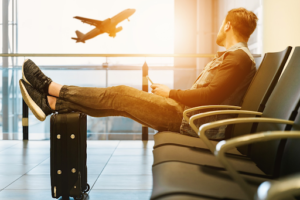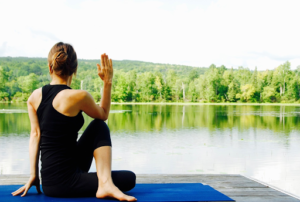Over 1 million people travel every day for business in the U.S., and of course, many more people travel for pleasure. Even though travel is usually enjoyable, the stress of airports or long car rides can put a strain on your body’s immune system. Even when there isn’t a new virus going around, there are some tips you should follow to stay healthy while traveling.
1.De-stress
If you are traveling for pleasure, the whole point is to relax from the stresses of everyday life. Airport security lines, long flights in cramped seats, and the culture shock of a new place can all be stressful. Be mindful of how you are feeling during your trip, and if you feel stressed or anxious, take some time out to take care of yourself. Studies have shown that stress is the single most significant factor for determining if someone will catch a cold.
Do some breathing exercises- in for a count of three, pause, out for a count of six, pause, repeat. Don’t be afraid to spend part of the day in your room laying around and watching T.V. Afterall, how often do you get to have a day like that when you’re not on vacation? If you are traveling internationally, culture shock can cause stress, even if you are enjoying the adventure. Try listening to a podcast in your mother tongue or find a chain restaurant or store that you go to at home and spend some time there.
Don’t try to rush through a long car drive; this creates stress and can be potentially unsafe if you end up speeding or driving while fatigued. Instead, enjoy the journey by stopping at quirky roadside attractions along the way or spending one more night in a hotel before getting to your destination.
2.Take Care of Yourself
Sometimes on vacation, we get so busy exploring a new place that we forget to take care of ourselves like we would at home. No matter where you are, you still need 7 to 9 hours of sleep and around 64 oz of water a day to be at your best. You also need healthy food and exercise.
You might find that you need more sleep on your trip than you need at home. Changing time zones, hauling luggage, long hours driving, or walking around a new city- whew- it’s exhausting. Let yourself get some extra rest if you need it so that you’ll feel refreshed when you get home.
Digestive problems are common in travelers. Sometimes these can be caused by food poisoning or drinking bad water, but more often they are caused by a change in habits. If you are sitting for long hours at a time on a plane or in a car, your body will slow things down. Combine this with less water than usual, and rich food, and you have a recipe for constipation and indigestion.
Try to get moving on your trip and take short walking breaks during car rides and long flights. Restaurant food tends to be heavy and low on fiber, so try to order at least a few vegetarian meals or eat fruits and vegetables as a side. This will help to keep you regular and give you the nutrition you need to be energized on your trip.
3. Give Your Muscles Some Love
After five hours sitting in coach, you might be wishing that you’d paid for the upgraded seat. Your back and neck can take a beating during travel. Sitting in a car can be just as bad as a plane. Some simple stretching can help to keep you pain-free and limber on your vacation.
To stretch your neck, turn your head to the side with your chin pointing towards your shoulder and hold for 15 to 30 seconds, then do the other side. You can also gently pull your head to the right side with your left hand while using your right hand to pull down on the top of your shoulder, then switch. This will help to ease the tightness that can be caused by stress.
If your back is acting up, lay on your back, and gently pull one knee at a time in towards your chest exhaling as you do so. This will help to open up your hips and ease the strain on your lower back. The Piriformis Stretch can be helpful if you are having sciatic nerve pain. Long hours sitting can inflame the piriformis muscles in your glutes, causing pain and irritation to the sciatic nerve. To stretch them out, lie on your back with one knee bent. Put the ankle of your other leg over your bent knee and pull the knee in toward your chest. Hold for 30 to 60 seconds then repeat for the other leg.
You can easily do these stretches before you leave for your drive or flight and after you arrive at your hotel room. You might also want to see a chiropractor after you get back from vacation so that you don’t have to return to work with sore muscles.
4.Keep it Clean
You don’t need to turn into a hand sanitizing fanatic on vacation, but there are some places where it’s recommended. Loads of studies have shown that airplanes are filthy. So using hand sanitizer while on a plane and avoiding touching your face are reasonable precautions to take. If you are eating on a flight, avoid eating food that falls on the tray. Scientists have found several strains of bacteria on airplane trays, including E Coli.
If you are traveling in a developed country, the tap water is probably safe to drink, but keep in mind that minerals that you aren’t used to can also cause stomach upset. If in doubt about the water or if you have a sensitive system, then it’s best to stick to bottled water. If the water where you are is not safe to drink, then you should also avoid ice cubes and food that has been rinsed in the water.
Washing your hands is just as important on vacation as at home. Even if the country you are in has non-potable tap water, you can still wash your hands in it as long as you are using anti-bacterial soap. Remember to rub your hands together for at least twenty seconds. Friction is the main germ killer, not the soap itself.





